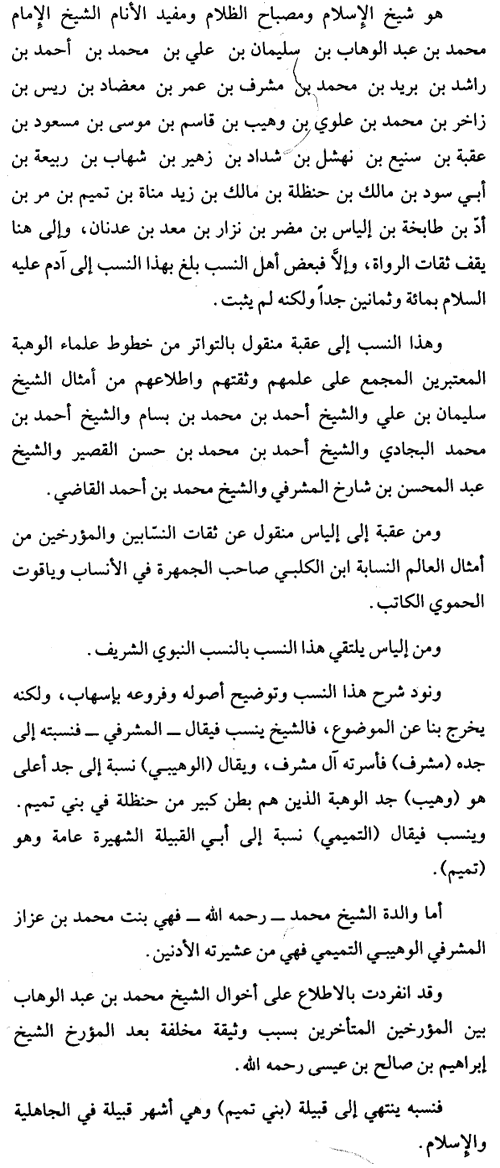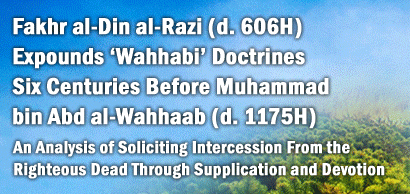 |
You are here:
Home  History
History
The Genealogy of Shaykh Muhammad Bin Abd Al-Wahhaab
Posted by Abu.Iyaad, Editor in History
|
 |
This genealogy is provided by Shaykh Abd Allaah bin Abd al-Rahmaan bin Salih Aal Bassaam in his excellent, Ulamaa Najd Khilaal Thamaaniyyah Quroon (Dar al-Aasimah, 1st edition, 1419H, 1/125-126):
 He is the Shaykh of Islam, the lamp for the darkness the beneficiary to the creation, the Shaykh, the Imaam Muhammad bin Abd al-Wahhaab bin Sulaymaan bin Alee bin Muhammad bin Ahmad bin Raashid bin Burayd bin Muhammad bin Mashraf bin Umar bin Mi'daad bin Rees bin Zaakhir bin Muhammad bin Alawee bin Wuhayb bin Qaasim bin Moosaa bin Mas'ood bin Uqbah bin Sanee' bin Nahshal bin Shaddaad bin Zaheer bin Shihaab bin Rabee'ah bin Abee Saud bin Maalik bin Handhalah bin Maalik bin Zayd Manaah bin Tameem bin Murr bin Add bin Taabikhah bin Ilyaas bin Madhar bin Nazaar bin Mu'idd bin Adnaan. And it is to (this point in the genealogy) that the trustworthy reporters end. Otherwise, there are some genealogist who take this genealogy all the way back to Aadam (alayhis salaam) through 180 generations, but that is not established. He is the Shaykh of Islam, the lamp for the darkness the beneficiary to the creation, the Shaykh, the Imaam Muhammad bin Abd al-Wahhaab bin Sulaymaan bin Alee bin Muhammad bin Ahmad bin Raashid bin Burayd bin Muhammad bin Mashraf bin Umar bin Mi'daad bin Rees bin Zaakhir bin Muhammad bin Alawee bin Wuhayb bin Qaasim bin Moosaa bin Mas'ood bin Uqbah bin Sanee' bin Nahshal bin Shaddaad bin Zaheer bin Shihaab bin Rabee'ah bin Abee Saud bin Maalik bin Handhalah bin Maalik bin Zayd Manaah bin Tameem bin Murr bin Add bin Taabikhah bin Ilyaas bin Madhar bin Nazaar bin Mu'idd bin Adnaan. And it is to (this point in the genealogy) that the trustworthy reporters end. Otherwise, there are some genealogist who take this genealogy all the way back to Aadam (alayhis salaam) through 180 generations, but that is not established.
This genealogy to Uqbah is narrated through tawaatur (large-scale transmission) from the manuscripts of the talented, accepted scholars whose knowledge, trustworthiness and research is agreed upon such as Shaykh Sulayman bin Alee, Shaykh Ahmad bin Muhammad bin Bassaam, Shaykh Ahmad bin Muhammad al-Bajaadee, Shaykh Ahmad bin Muhammad bin Hasan al-Qaseer, Shaykh Abd al-Muhsin bin Shaarikh al-Mashrafee and Shaykh Muhammad bin Ahmad al-Qaadee. From Uqbah to Ilyaas (the genealogy) is narrated through the trustworthy genealogists and historians from the likes of the scholar, genealogist, Ibn a-Kalbee (d 204H), the author of al-Jamharah Fil-Ansaab and Yaaqoot al-Hamawi (d. 626H), the writer. From Ilyaas, this genealogy meets with the noble Prophetic genealogy. And we would love to explain this genealogy and explain its foundations and branches at some length but it would divert us from the topic. The Shaykh is ascribed, when it is said al-Mashrafi, then his ascription is to his ancestor, Mashraf, so his family is Aal Mashraf. And it is also said, al-Wuhaybi, an ascription to his earlier ancestor which is Wuhayb, the grandfather of the Wahbah, those who constitute a large core of (the tribe of) Handhalah from Banu Tameem. So he is ascribed, and it is said al-Tameemee, an ascription to the father of the well-known tribe in general, who is Tameem. As for the mother of the Shaykh, may Allaah have mercy upon her - she is Bint Muhammad bin Ghazaar al-Mashrafi, al-Wuhaybee, al-Tameemee, so she is from his same family of the Adanees. And I was unique in knowing the maternal uncles of Shaykh Muhammad bin Abd al-Wahhaab amongst the later historians on account of a manuscript left after the historian Shaykh Ibraaheem bin Saalih bin Eesaa (rahimahullaah). Hence, his (Shaykh Muhammad bin Abd al-Wahhaab's) genealoogy ends at the tribe of Banu Tameem which is the most famous of the tribes in jaahiliyyah and Islaam.
Then the author quotes the hadeeth of Abu Hurairah (radiallaahu anhu):
 I have never ceased to love Banee Tameem since I heard three (matters) from the Messenger of Allaah (sallallahu alayhi wasallam). I heard the Messenger of Allaah (sallallahu alayhi wasallam) say, "They (Banu Tameem) are the most severe of my Ummah against the Dajjaal." He (Abu Hurairah) said. And their charity came (that of Banu Tameem) so the Prophet (sallallahu alayhi wasallam) said, "This is the charity of our people (meaning Banu Tameem)." And he (Abu Hurairah) said, "And there was a female captive of war with Aa'ishah (radiallaahu anhaa) so the Messenger of Allaah (sallallahu alayhi wasallam) said, 'Free her for she is from the offspring of Ismaa'eel'." Reported by al-Bukhari and Muslim I have never ceased to love Banee Tameem since I heard three (matters) from the Messenger of Allaah (sallallahu alayhi wasallam). I heard the Messenger of Allaah (sallallahu alayhi wasallam) say, "They (Banu Tameem) are the most severe of my Ummah against the Dajjaal." He (Abu Hurairah) said. And their charity came (that of Banu Tameem) so the Prophet (sallallahu alayhi wasallam) said, "This is the charity of our people (meaning Banu Tameem)." And he (Abu Hurairah) said, "And there was a female captive of war with Aa'ishah (radiallaahu anhaa) so the Messenger of Allaah (sallallahu alayhi wasallam) said, 'Free her for she is from the offspring of Ismaa'eel'." Reported by al-Bukhari and Muslim
Link to this article: Show:
HTML Link •
Full Link •
Short Link
Share or Bookmark this page: You will need to have an account with the selected service in order to post links or bookmark this page.







|
|
|
Add a Comment
You must be registered and logged in to comment.
|
 |




|
 |
 History
History



 He is the Shaykh of Islam, the lamp for the darkness the beneficiary to the creation, the Shaykh, the Imaam Muhammad bin Abd al-Wahhaab bin Sulaymaan bin Alee bin Muhammad bin Ahmad bin Raashid bin Burayd bin Muhammad bin Mashraf bin Umar bin Mi'daad bin Rees bin Zaakhir bin Muhammad bin Alawee bin Wuhayb bin Qaasim bin Moosaa bin Mas'ood bin Uqbah bin Sanee' bin Nahshal bin Shaddaad bin Zaheer bin Shihaab bin Rabee'ah bin Abee Saud bin Maalik bin Handhalah bin Maalik bin Zayd Manaah bin Tameem bin Murr bin Add bin Taabikhah bin Ilyaas bin Madhar bin Nazaar bin Mu'idd bin Adnaan. And it is to (this point in the genealogy) that the trustworthy reporters end. Otherwise, there are some genealogist who take this genealogy all the way back to Aadam (alayhis salaam) through 180 generations, but that is not established.
He is the Shaykh of Islam, the lamp for the darkness the beneficiary to the creation, the Shaykh, the Imaam Muhammad bin Abd al-Wahhaab bin Sulaymaan bin Alee bin Muhammad bin Ahmad bin Raashid bin Burayd bin Muhammad bin Mashraf bin Umar bin Mi'daad bin Rees bin Zaakhir bin Muhammad bin Alawee bin Wuhayb bin Qaasim bin Moosaa bin Mas'ood bin Uqbah bin Sanee' bin Nahshal bin Shaddaad bin Zaheer bin Shihaab bin Rabee'ah bin Abee Saud bin Maalik bin Handhalah bin Maalik bin Zayd Manaah bin Tameem bin Murr bin Add bin Taabikhah bin Ilyaas bin Madhar bin Nazaar bin Mu'idd bin Adnaan. And it is to (this point in the genealogy) that the trustworthy reporters end. Otherwise, there are some genealogist who take this genealogy all the way back to Aadam (alayhis salaam) through 180 generations, but that is not established.  I have never ceased to love Banee Tameem since I heard three (matters) from the Messenger of Allaah (sallallahu alayhi wasallam). I heard the Messenger of Allaah (sallallahu alayhi wasallam) say, "They (Banu Tameem) are the most severe of my Ummah against the Dajjaal." He (Abu Hurairah) said. And their charity came (that of Banu Tameem) so the Prophet (sallallahu alayhi wasallam) said, "This is the charity of our people (meaning Banu Tameem)." And he (Abu Hurairah) said, "And there was a female captive of war with Aa'ishah (radiallaahu anhaa) so the Messenger of Allaah (sallallahu alayhi wasallam) said, 'Free her for she is from the offspring of Ismaa'eel'." Reported by al-Bukhari and Muslim
I have never ceased to love Banee Tameem since I heard three (matters) from the Messenger of Allaah (sallallahu alayhi wasallam). I heard the Messenger of Allaah (sallallahu alayhi wasallam) say, "They (Banu Tameem) are the most severe of my Ummah against the Dajjaal." He (Abu Hurairah) said. And their charity came (that of Banu Tameem) so the Prophet (sallallahu alayhi wasallam) said, "This is the charity of our people (meaning Banu Tameem)." And he (Abu Hurairah) said, "And there was a female captive of war with Aa'ishah (radiallaahu anhaa) so the Messenger of Allaah (sallallahu alayhi wasallam) said, 'Free her for she is from the offspring of Ismaa'eel'." Reported by al-Bukhari and Muslim








